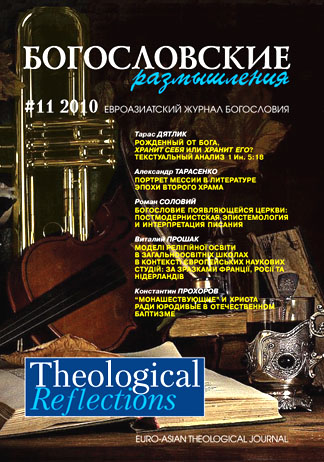“Living as Monks” and Fools for Christ,s Sake in the Russian Baptist Brotherhood
Keywords:
Living as Monks, Fools for Christ, s Sake, Russian Baptist BrotherhoodAbstract
The author compares the Russian-Ukrainian Baptist brotherhood - first of all, in its late Soviet form - with the Russian Orthodox concept of "monasticism in the world." Characteristic examples of asceticism among Russian Baptists, in some cases bordering on foolishness for Christ's sake, are described and analyzed, which to some extent may be explained by what is common to Christians of Russia, namely the "Eastern Christian" understanding of holiness. In addition, the parallels between some known hagiographical narratives of Russian Baptists and the "Lives of the Saints" are drawn; both external and internal similarities are noted. The article attempts to clear up the misunderstandings connected with the subject and at the inter-confessional level, in the context of church history in general, to demonstrate the legitimacy of the thesis of the "monastic way" of Russian Baptists. The work is based to a large measure on primary sources - books, articles, and interviews, reflecting the tradition of the Evangelical-Baptist brotherhood before the beginning of perestroika.Downloads
How to Cite
Issue
Section
License
Copyright (c) 2020 Constantine PROKHOROV

This work is licensed under a Creative Commons Attribution-NonCommercial 4.0 International License.
All articles published in the Journal are distributed under a Creative Commons Attribution-NonCommercial 4.0 International License
By submitting an article for publication in Theological Reflections: Eastern European Journal of Theology the author grants the editors the right to publish the article and distribute it in electronic and print form.
The author reserves all copyrights and the right to use the materials of the article in whole or in part for educational purposes, to write his own dissertations, to prepare abstracts, conference reports, oral presentations, etc., as well as post electronic copies of articles (including the final electronic version downloaded from the journal’s official website) on non-commercial web-resources without the consent of the editorial board and founders.



